Happiness in (Literary) Magazines
22/9/2015
Last month, a Facebook friend shared an intriguing blog post from Structo, a self-funded, bi-annual literary magazine. In the post, editor Euan Monaghan explained that their next call for submissions would contain a 'fee' (of sorts), but one that they hoped everyone could get behind. Motivated by the fact that two of their favourite magazines had recently closed down, the idea was that everyone who submitted work for Structo 15 had to also show that they had bought the latest issue of a literary magazine. And that is, any literary magazine, not just Structo:
"If you send writing to literary magazines, we reckon you should support the ones you enjoy; that way they are more likely to be around the next time you want to send them work." In their submission guidelines, Structo link to an excellent article by Lynne Barrett: 'What Editors Want; A Must-Read for Writers Submitting to Literary Magazines'. It's by far the best 'How to Submit' article I've read, and I really recommend you take a look. Alongside some excellent advice for those hoping to get their work published, there's a paragraph or two on the importance of actually reading the magazines you're submitting to. It may seem like a no-brainer, but as Barrett's anecdotal evidence suggests, some literary submitters still aren't prepared to do their homework. It reminded me of a Facebook post I shared a few months ago:
I've heard/read many variations on this in the last few years. I'm almost certainly paraphrasing here, but I believe an editor of one of the 'big three' Welsh literary magazines once suggested that if the magazine had as many subscribers as it did Facebook friends, then its future wouldn't be so uncertain. A sorry state of affairs, given the consistent quality of writing on offer from that particular publication. I'm not saying that anyone should feel obliged to buy – it's our hard-earned money after all – but I will echo Structo's belief that we should support the ones we enjoy (and that's with banknotes and PayPal transactions, not just retweets and page 'likes'). So, with this in mind, I thought I'd share a list of my personal favourites. There are others worthy of honourable mentions of course (Bare Fiction, The Lampeter Review, Poetry, Poetry Wales...), but the following four magazines are the ones that have become permanent fixtures on my bedside table.
Popshot
Popshot is stunning. I've been a subscriber ever since I found their first issue in Borders' magazine section in 2009, and now I can't imagine missing an issue. Originally focused on poetry alone, it relaunched in 2012 with the strapline 'The Illustrated Magazine of New Writing' to include short stories and flash fiction. Each issue is centred on a theme, with illustrations accompanying each piece of writing. Published bi-annually (with a subscription price of just £10), Dazed & Confused called it "a who isn't yet who of contemporary literature." popshotpopshot.com
The Ghastling
Earlier this year I mentioned that The Ghastling was one of my favourite magazines, and nothing's changed. A magazine of "ghosts, the macabre and the oh-so peculiar", it definitely appeals to a niche audience, but editor Rebecca Parfitt is committed to publishing the best literary fiction that chills, shivers, surprises and horrifies – so you won’t find any undue gore or Twilight-lite amongst its pages. Like Popshot, The Ghastling is another illustrated magazine that is a sight to behold, taking its design cues from the penny dreadfuls of Victorian Britain. Issues are available to read for free online, but the print copy is a thing of absolute beauty. theghastling.com
Planet
Given the fact that it isn't exclusively dedicated to literature, there could be an argument that Planet (or to give its full title: Planet - The Welsh Internationalist) shouldn't be on this list of my favourite literary magazines. However, there was no way I was omitting it. A quarterly cultural and political magazine that looks at Wales from an international perspective, and at the world from the standpoint of Wales, Planet publishes high-quality writing, artwork and photography by established and emerging figures, with each issue featuring poetry and short fiction that connects in some way with the broad range of issues and concerns of the magazine. planetmagazine.org.uk
Lighthouse
A relatively new quarterly journal (Issue 9 was launched this summer), Lighthouse seeks to publish the best short fiction and poetry emerging from the UK writing scene, alongside feature articles from better-known writers. Part of Gatehouse Press, a publisher of new fiction and poetry, it was named 'Best Magazine' at the 2015 Saboteur Awards. I've only recently discovered Lighthouse, but two issues were all it took for me to fall in love with its mix of high-quality content and simple, pared-down design. The free supplements on their website give a good idea of what to expect for your £5. gatehousepress.com/lighthouse
Postscript: We've recently adopted two cats and, as my Instagram followers will attest, I don't need too much of an excuse to take pictures of them. So Structo's suggestion that proof of having bought the current issue of a literary magazine could be a "photo of your cat and/or other cute animal sitting on a pile of subscriptions" was all the encouragement I needed to subject one of them to another 30-minute photoshoot. I think we captured his best angle.
0 Comments
Lighthouse #9
8/9/2015
Usually, if I'm writing a blog post about having something published in a magazine, I would open with a sentence along the lines of "a poem of mine was recently featured in...". But, even though my name appears above it on the back cover of the latest issue of Lighthouse, 'Magnetic' isn't my poem – at least not in the traditional sense.
Found poetry is a form where poets take existing text and repurpose or reframe it as a new piece of writing. The existing text might come from a newspaper article, a political speech, a piece of graffiti or even another poem, with the resulting found poem being defined as either 'treated' or 'untreated'. As an art form, there are obvious comparisons with the controversial objets trouvés of the visual arts – and, as you might expect, found poets are sometimes also accused of hiding behind the ready-made. Though I disagree that found poetry is intellectual theft on the same level as the recent Laventille fiasco, it is hard to argue against the fact that it occasionally enters the grey area that exists between appropriation and plagiarism. When I first submitted this poem to Lighthouse for their 'writing with constraints' issue, it came with a disclaimer: Five poems found on my fridge, created by friends and friends of friends using magnetic words. Written in size 10 font just below the title, this was my attempt to give a source (and, I suppose, to distance myself from accusations of stealing), but it was sliced away – along with a small number of other flabby words and phrases – following some welcome suggestions from Lighthouse editors Julia Webb and Anna de Vaul. For me, the joy of this particular form is finding poetry in unlikely places. Elsewhere in this issue of Lighthouse, for example, is a found poem formed from a medieval act of parliament. Like 'Magnetic', this poem – 'An Acte for the Preservation of Grayne, 1566' by Matt Howard – is untreated (as far as I can tell), but it’s also taken from an existing text that was never intended to be a poem. This is where the two poems differ, and where mine enters that aforementioned grey area. |
Categories
All
Archives
January 2024
|
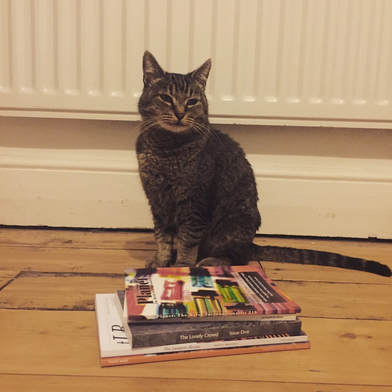
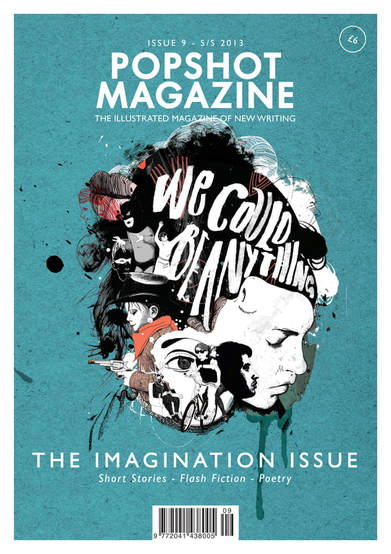
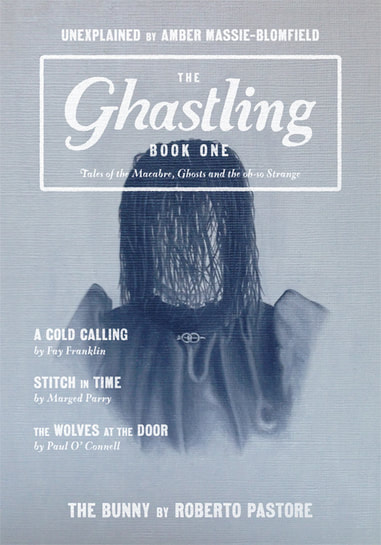

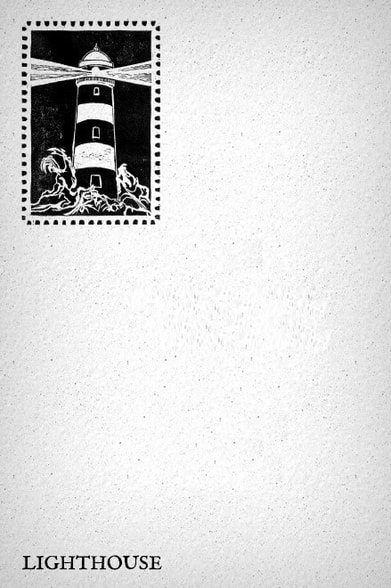
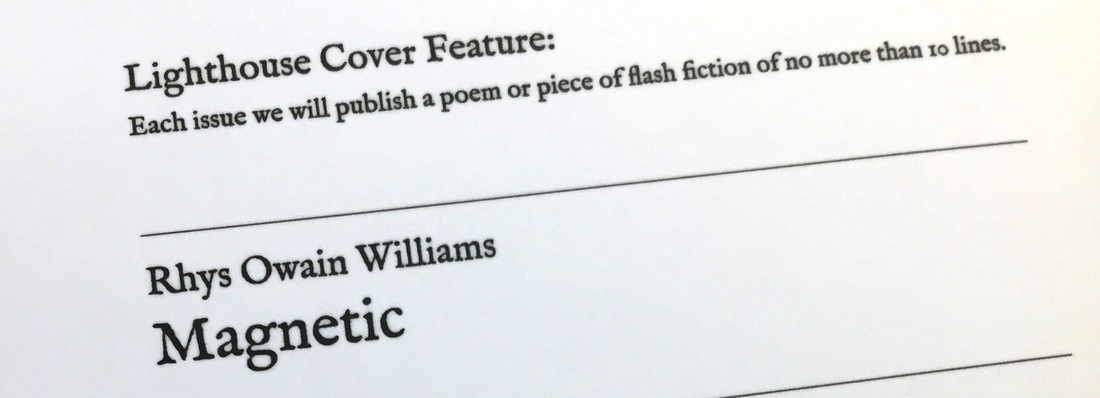
 RSS Feed
RSS Feed
